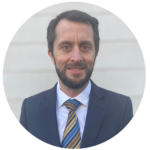
|
By Matthew Illian, Director of Responsible Investing |
When President Emmerson Mnangagwa calls the United Nations into session on September 21, he will do so virtually from his home in Zimbabwe due to COVID-19 travel precautions. He and other global leaders face two sobering realities. First, the pandemic has exacerbated economic stress for the globe’s most vulnerable. And second, after an initial brief patch of clear skies and clean air, the world’s economic engines turned back on and are now spewing more pollutants than ever before.
Since 2015, the United Nations has published an annual Sustainable Development Goals (SDGs) Report to mark progress on achieving global prosperity and sustainability. While most years offer reasons to celebrate, the 2021 report is a gut-wrencher. Poverty and inequality are on the rise. The COVID-19 virus has caused the premature deaths of at least 3 million people. An additional 100+ million children have fallen below minimum reading proficiency due to school closures.
As for the planet, ocean dead zones are growing. Over 37,000 land and water species are threatened with extinction. In addition, carbon dioxide, methane and nitrous oxide (greenhouse gases) have all risen to record highs during 2020.
Meanwhile, the stock market is hitting all-time highs, and many can generate more wealth in the global economy than ever before. How do we reconcile these things? How will we answer when a prophet asks us to consider the disparities?
I could offer many specific examples of how United Church Funds is striving to invest in a more just world, but the question remains. Can the world expect better outcomes going forward than what we have reaped thus far? What new strategies are required coming out of a pandemic? Will we build back better?
I want to highlight one practice that I believe is key to building back better. Investors can do a much better job at seeking input from historically marginalized groups. In our Christian tradition, we are inspired by Jesus of Nazareth, who often positioned himself at the edge of society and welcomed the marginalized with culture-defying compassion.
Historically, investment managers do not have an outstanding track record of considering the perspectives of those living on the margins. Input is rarely sought from marginalized Black, Indigenous, People of Color (BIPOC) communities that are being polluted and reshaped by climate change, and whose members work the low-wage labor to bring food and goods to our doorsteps from around the world.
Not only is listening to local stakeholders the right thing to do, but there is also a growing business case for this work. A community ignored or scorned can exact a significant financial prices in the present and impose opportunity costs for a company in the future,” shares Jonathan Lash of the World Resources Institute. Reputational value is more important than ever before as intangibles now account for 90% of the value in the S&P 500.
There are signs that asset managers are paying more attention to the voices of local communities. One group that offers an important example of this local engagement work is the Investor Alliance for Human Rights, which represents investment managers from over 18 countries. This alliance does not just establish human rights standards from on high; many of the meetings are focused on hearing from those who are directly affected, such as dairy farm workers in Vermont (Migrant Justice) or people with personal connections to human rights abuses in China’s labor camps (End Uyghur Forced Labor).
Another group, Investors & Indigenous Peoples Working Group, offers asset managers the opportunity to hear directly from native peoples advocating to ensure the protection of their tribal land rights. On September 16, investors will have the opportunity to hear from four different indigenous leaders, who are speaking on indigenous rights concerning Securities and Exchange Commission (SEC) rulemaking, international law and business risks that many companies are not yet disclosing.
Lastly, the Interfaith Center for Corporate Responsibilities’ (ICCR) Just Transition working group is in dialogue with community groups most impacted by the transition to a low carbon economy. Specifically, the coalition, of which UCF is a founding member, is working with labor groups in Massachusetts who are losing jobs as local utilities transition to new green jobs. Many investors believe that large corporations are responsible for ensuring that laborers and communities that helped them achieve corporate success do not get “stranded” during the transition.
At United Church Funds, we will continue to advocate for a much broader set of stakeholders who bring lived experiences and perspectives that are essential to achieving a more just and thriving future. United Nations political leaders cannot create more sustainable development on their own. Sustainable growth is also dependent on private capital, and the more managers that are listening to local communities, the better off we will all be.